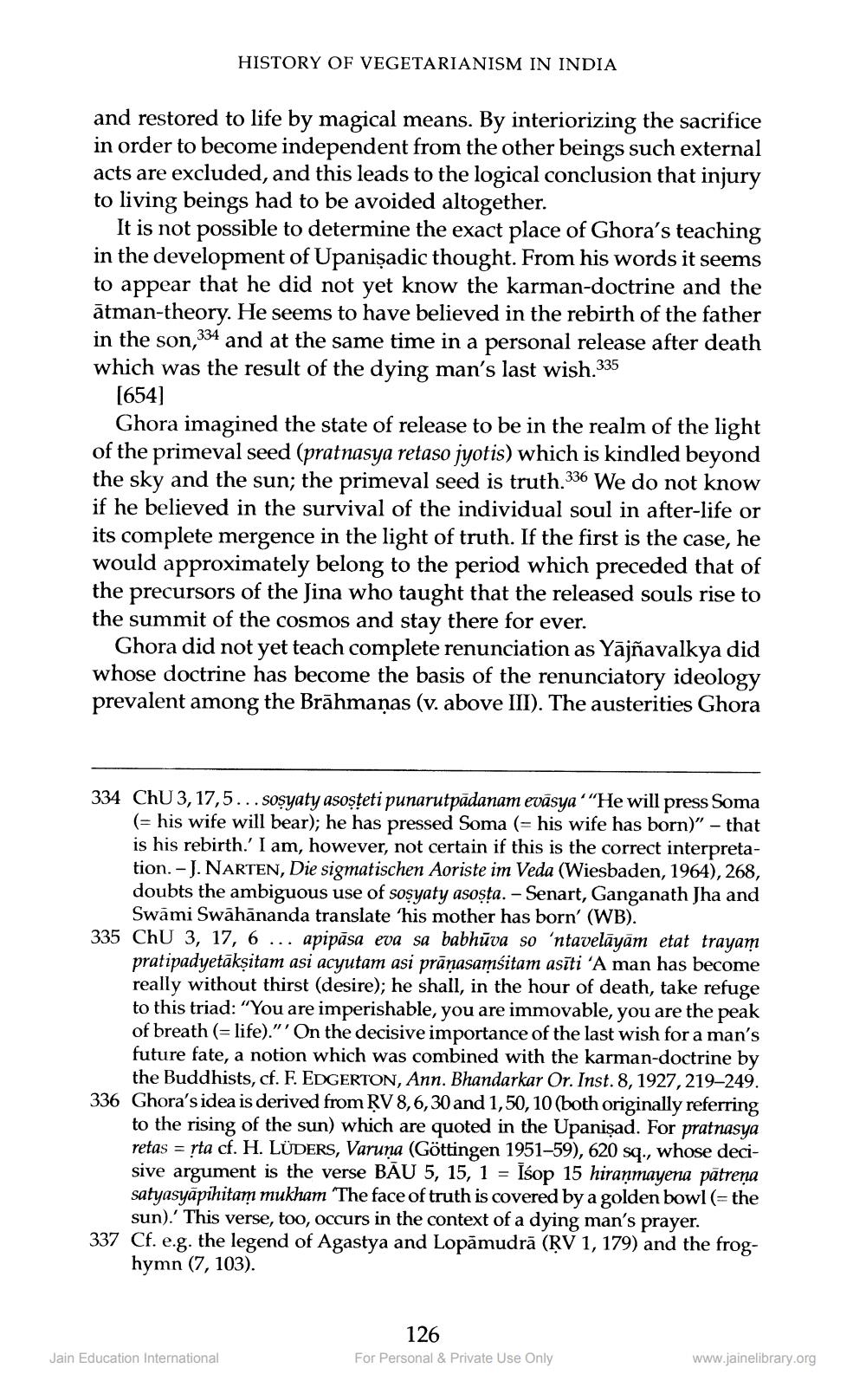________________
HISTORY OF VEGETARIANISM IN INDIA
and restored to life by magical means. By interiorizing the sacrifice in order to become independent from the other beings such external acts are excluded, and this leads to the logical conclusion that injury to living beings had to be avoided altogether.
It is not possible to determine the exact place of Ghora's teaching in the development of Upanișadic thought. From his words it seems to appear that he did not yet know the karman-doctrine and the ātman-theory. He seems to have believed in the rebirth of the father in the son,334 and at the same time in a personal release after death which was the result of the dying man's last wish.335
[654] Ghora imagined the state of release to be in the realm of the light of the primeval seed (pratnasya retaso jyotis) which is kindled beyond the sky and the sun; the primeval seed is truth.336 We do not know if he believed in the survival of the individual soul in after-life or its complete mergence in the light of truth. If the first is the case, he would approximately belong to the period which preceded that of the precursors of the Jina who taught that the released souls rise to the summit of the cosmos and stay there for ever.
Ghora did not yet teach complete renunciation as Yājñavalkya did whose doctrine has become the basis of the renunciatory ideology prevalent among the Brāhmaṇas (v. above III). The austerities Ghora
334 ChU3, 17,5... sosyaty asosteti punarutpädanam evāsya'"He will press Soma
(= his wife will bear); he has pressed Soma (= his wife has born)" - that is his rebirth.' I am, however, not certain if this is the correct interpretation. - J. NARTEN, Die sigmatischen Aoriste im Veda (Wiesbaden, 1964), 268, doubts the ambiguous use of sosyaty asosta. - Senart, Ganganath Jha and
Swami Swāhānanda translate his mother has born' (WB). 335 ChU 3, 17, 6 ... apipāsa eva sa babhūva so'ntavelāyām etat trayam
pratipadyetākṣitam asi acyutam asi prāṇasaņšitam asīti 'A man has become really without thirst (desire); he shall, in the hour of death, take refuge to this triad: "You are imperishable, you are immovable, you are the peak of breath (=life)."'On the decisive importance of the last wish for a man's future fate, a notion which was combined with the karman-doctrine by
the Buddhists, cf. F. EDGERTON, Ann. Bhandarkar Or. Inst. 8, 1927, 219–249. 336 Ghora's idea is derived from RV 8,6,30 and 1,50, 10 (both originally referring
to the rising of the sun) which are quoted in the Upanişad. For pratnasya retas = sta cf. H. LÜDERS, Varuna (Göttingen 1951–59), 620 sq., whose decisive argument is the verse BAU 5, 15, 1 = Išop 15 hiranmayena pätrena satyasyāpihitam mukham The face of truth is covered by a golden bowl (=the
sun).' This verse, too, occurs in the context of a dying man's prayer. 337 Cf. e.g. the legend of Agastya and Lopamudrā (RV 1, 179) and the frog
hymn (7, 103).
126 For Personal & Private Use Only
Jain Education International
www.jainelibrary.org




